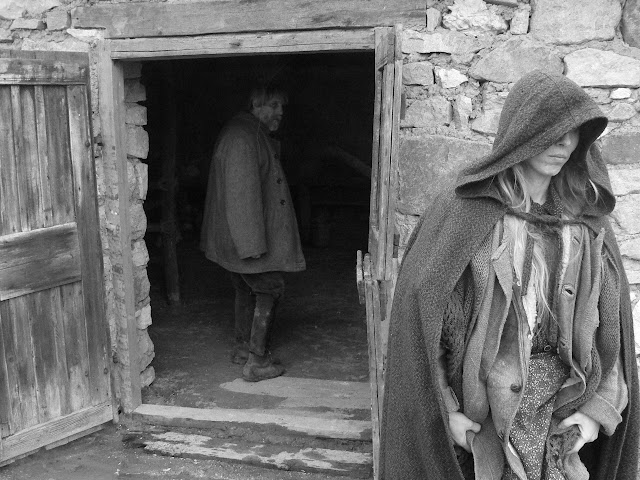My first, and due to scheduling conflicts and travel costs, possibly my only visit to this year's New York Film Festival, was an afternoon press screening of of Noah Baumbach's Frances Ha. A film that has annoyed as many people as it has impressed. Here is my take on the whole thing.
Noah Baumbach, the Brooklyn-born writer/director of such arthouse hits as Kicking and Screaming, Margot at the Wedding and The Squid and the Whale, is at it again. This time around he is joined by muse/girlfriend Greta Gerwig (last seen, Baumbach-wise, in the director's last effort, Greenberg) as co-screenwriter and star. The film, done in crisp black and white (actually shot in colour and, in the most anti-Ted Turner style, transferred into monochrome) and shot on a minimal budget in and around Brooklyn, is the story of a twentysomething New York dancer - or perhaps we should say, wannabe dancer - who is semi-abandoned by her BFF when a better apartment in Tribeca comes up. The film follows the intrepid Frances, as played quite instinctively by Ms. Gerwig (she did create the character after all), as she hops from apartment to apartment, straining to move on from her slackeresque past and into an uncertain future. Both whimsical and jaded, and at times quite brilliant, Frances Ha is the kind of arthouse film that many would, and many indeed have, called pretentious.
Now the term pretentious has been used to describe Baumbach and his work since pretty much the beginning, but such a term is merely an angry tool used by those critics, and so-called average filmgoers, who do not fully understand what the writer and/or director were going for. Much like how the Republicans have turned the word Liberal into a dirty word, critics with little to no knowledge of what cinema is all about, have taken the term pretentious - which granted does not shine the greatest of lights on its intended subject to begin with - and used it to describe anything that potentially goes over their head - anything that is too arty for their sensibilities. In other words, the cinema of, among others, Noah Baumbach. Now I realize Frances Ha, with its lackadaisical take on being young in the big city (damn hipster whipper-snappers I can hear them yelping now) or its monochromatic artistic affectations (too, and I hate hate hate this term, artsy-fartsy they complain), or its constant allusions to the French New Wave, is not a film for everyone (but then what film is) and one could easily, and bluntly describe it as Woody Allen makes a Mumblecore homage to François Truffaut, which of course would throw off most of these aforementioned shoot-from-the-hip critics, as well as most of your multiplex denizens, but those who toss the film off as mere pretentious arthouse gobbely-gook, are missing out on what is, for all intents and purposes, a rather brilliantly quaint film.
My second favourite Baumbach, following just The Squid and the Whale, Frances Ha can be seen as the most Trauffaut influenced film yet by the director who has already been influenced by Truffaut more than any other American director working today. Aside from the occasional Truffaut poster popping up in the background, or namedropping someone like Jean-Pierre Léaud (as well as Proust for the true Francophile), the film just feels like something the Nouvelle auteur would have made in his hey day. One can also see allusions to Truffaut's comrade-in-cinematic-arms Godard as well - from strategically-placed fedoras and purposely-placed shots where one is surprised to not see the film's characters break into a spontaneous rendition of the Madison, all the way to Gerwig playing Anna Karina to Baumbach's Godard - but the film, no matter how many so-called homage moments spring up (post-new waver Leos Carax is referenced as well), is pure Baumbach - but here it is a less bitter Baumbach that we saw in films like Squid and Margot. This kindler, gentler - but still quite acerbic when need be - Baumbach is most likely due to the influence of Gerwig, an actress who, when asked at the post screening Q&A why she acts the way she acts, referenced Johnny Cash on when he said he plays guitar "this way" because he knows no other. Perhaps this is the reason Baumbach makes films in the way he does - he knows no other way.



























